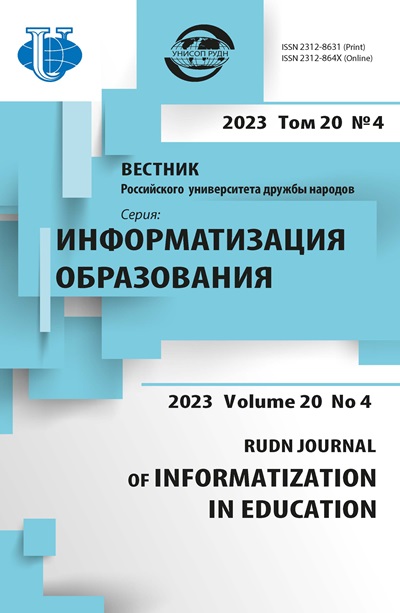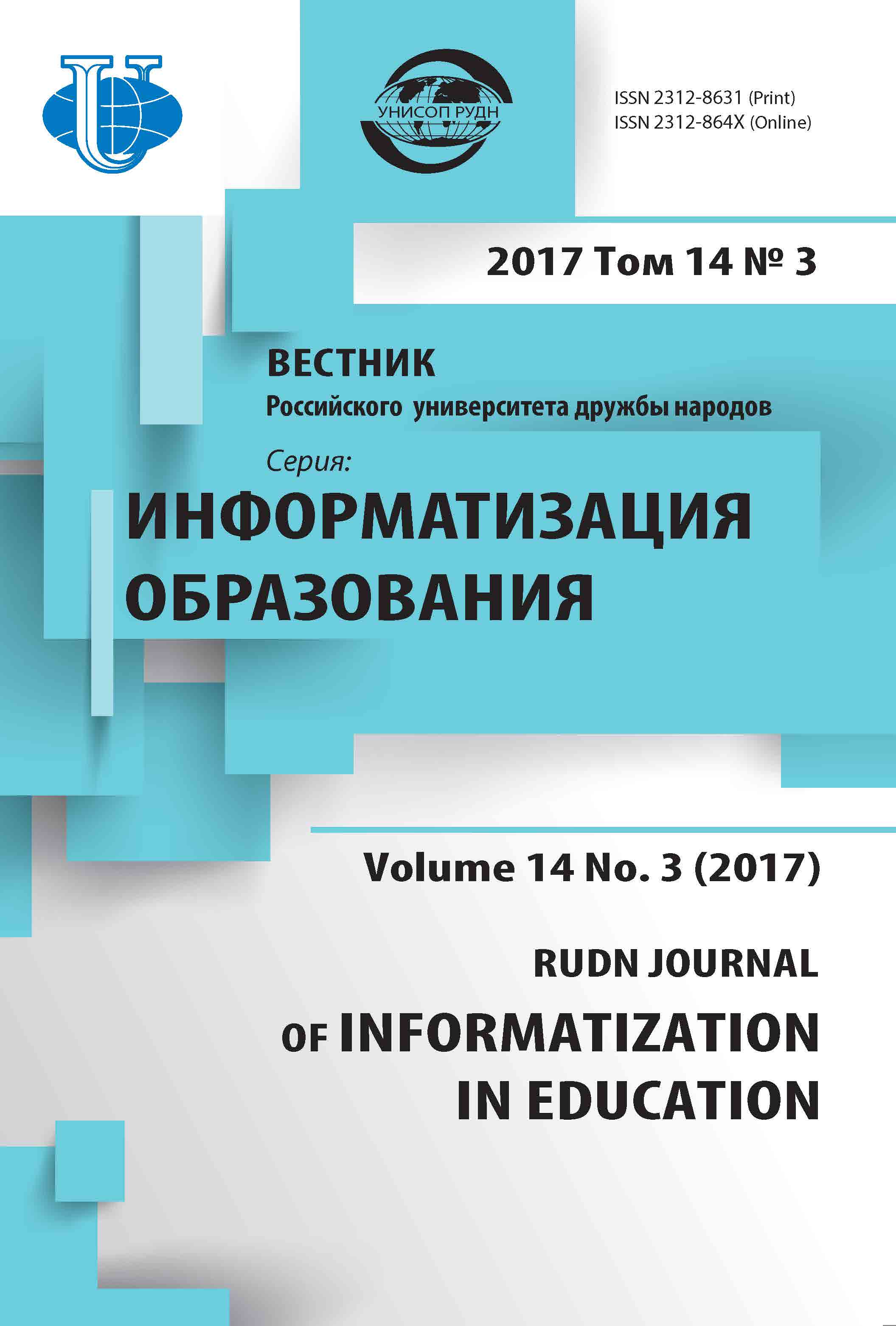INVARIANT PRACTICAL TASKS FOR WORK WITH DATABASES AT THE SECONDARY SCHOOL
- Authors: Kartashova LI1, Levchenko IV1, Pavlova AE1
-
Affiliations:
- Moscow City Pedagogical University
- Issue: Vol 14, No 3 (2017)
- Pages: 273-280
- Section: TEACHING COMPUTER SCIENCE
- URL: https://journals.rudn.ru/informatization-education/article/view/16926
- DOI: https://doi.org/10.22363/2312-8631-2017-14-3-273-280
Cite item
Full Text
Abstract
This article provides examples of practical tasks for creating and editing databases for secondary school students. Jobs are invariant in nature and do not depend on specific software tools. This is due to the fact that, at present, information technology and their tools are used almost everywhere, in various spheres of human activity. Therefore, the professional success of modern school graduates who have to live and work in the information society, depends on their ability to timely and correctly use information technology and their means for solving various tasks. This can be achieved when on the lessons of informatics will be examined not specific means of information technology, or specific versions of software that are changing rapidly, but will be implemented a fundamental invariant approach to teaching information technology. To do this it is important to select invariant IT learning content, define the sequence of learning issues, as well as to pick up correctly and logically build jobs that should be invariant relative to software. This approach to teaching information technology will have an impact on the formation of generalized ways of student information activities.
About the authors
L I Kartashova
Moscow City Pedagogical University
Author for correspondence.
Email: kartashovali@mgpu.ru
Kartashova Liudmila Igorevna, candidate of pedagogical sciences, associate professor, associate professor of the department of informatics and applied mathematics of the Moscow city pedagogical university.
Sheremetjevskaya str., 29, Moscow, Russia, 127521I V Levchenko
Moscow City Pedagogical University
Email: levchenkoiv@mgpu.ru
Levchenko Irina Vital’evna, doctor of pedagogical sciences, professor, professor of the department of Informatics and applied mathematics of the Moscow city pedagogical university.
Sheremetjevskaya str., 29, Moscow, Russia, 127521A E Pavlova
Moscow City Pedagogical University
Email: pavlovaae@mgpu.ru
Pavlova Anastasija Evgen’evna, candidate of social sciences, associate professor of the department of informatization of education of the Moscow city pedagogical university.
Sheremetjevskaya str., 29, Moscow, Russia, 127521References
- Kartashova L.I., Levchenko I.V., Pavlova A.E. Obuchenie uchashchihsya osnovnoj shkoly tekhnologii raboty s graficheskimi izobrazheniyami, invariantnoe otnositel’no programmnyh sredstv [Training students of the secondary school to technology of work with graphic images, invariant to software]. Vestnik Moskovskogo gorodskogo pedagogicheskogo universiteta. Serija «Informatika i informatizacija obrazovanija» [Bulletin of the Moscow city pedagogical university. “Informatics and Informatization of Education” series]. 2014. No. 1 (27). Pp. 37—46.
- Kartashova L.I., Levchenko I.V., Pavlova A.E. Obuchenie uchashchihsya osnovnoj shkoly tekhnologii raboty s tekstovymi dokumentami, invariantnoe otnositel’no programmnyh sredstv [Training students of the secondary school to technology of work with text documents, invariant to software]. Vestnik Moskovskogo gorodskogo pedagogicheskogo universiteta. Serija «Informatika i informatizacija obrazovanija» [Bulletin of the Moscow city pedagogical university. “Informatics and Informatization of Education” series]. 2013. No. 2 (26). Pp. 58—64.
- Kartashova L.I., Levchenko I.V., Pavlova A.E. Obuchenie uchashchihsya osnovnoj shkoly tekhnologii raboty s mul’timedijnymi tekhnologiyami, invariantnoe otnositel’no programmnyh sredstv [Training students of the secondary school to technology of work with multimedia technology, invariant to software]. Vestnik Moskovskogo gorodskogo pedagogicheskogo universiteta. Serija «Informatika i informatizacija obrazovanija» [Bulletin of the Moscow city pedagogical university. “Informatics and Informatization of Education” series]. 2015. No. 3 (33). Pp. 20—27.
- Kartashova L.I., Levchenko I.V., Pavlova A.E. Obuchenie uchashchihsya osnovnoj shkoly tekhnologii raboty s ehlektronnymi tablicami, invariantnoe otnositel’no programmnyh sredstv [Training students of the secondary school to technology of work with electronic spreadsheets, invariant to software]. Vestnik Moskovskogo gorodskogo pedagogicheskogo universiteta. Serija «Informatika i informatizacija obrazovanija» [Bulletin of the Moscow city pedagogical university. “Informatics and Informatization of Education” series]. 2016. No. 3 (37). Pp. 39—46.
- Levchenko I.V. Formirovanie invariantnogo soderzhaniya shkol’nogo kursa informatiki kak ehlementa fundamental’noj metodicheskoj podgotovki uchitelej informatiki [Formation of invariant contents of school course in informatics as a fundamental methodological training for teachers of Informatics]. Vestnik Rossijskogo universiteta druzhby narodov. Serija «Informatizacija obrazovanija» [Bulletin Peoples’ Friendship University of Russia. “Education Informatization” series]. 2009. No. 3. Pp. 61—64.
- Levchenko I.V. Metodicheskie osobennosti obucheniya informacionnym tekhnologiyam uchashchihsya osnovnoj shkoly [Methodological features of information technology training of students of the secondary school]. Vestnik Rossijskogo universiteta druzhby narodov. Serija «Informatizacija obrazovanija» [Bulletin Peoples’ Friendship University of Russia. “Education Informatization” series]. 2012. No. 1. Pp. 23—28.
- Kartashova L.I., Levchenko I.V. Metodika obucheniya informacionnym tekhnologiyam uchashchihsya osnovnoj shkoly v usloviyah fundamentalizacii obrazovanii [Methods of teaching information technology to primary school pupils in the face of fundamentalization of education]. Vestnik Moskovskogo gorodskogo pedagogicheskogo universiteta. Serija «Informatika i informatizacija obrazovanija» [Bulletin of the Moscow city pedagogical university. “Informatics and Informatization of Education” series]. 2014. No. 2 (28). Pp. 25—33.
















